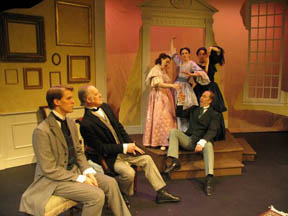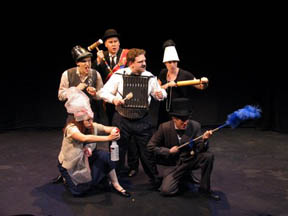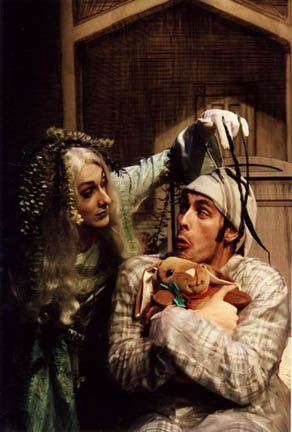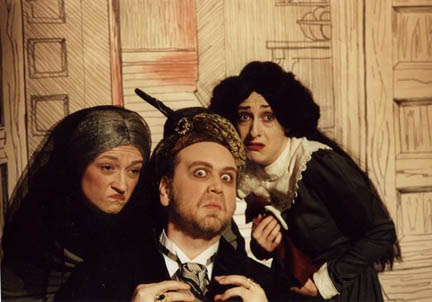The Good Parts: Literature Enacted
Jaime Kleiman finds that Hardcover Theater--a literary adaptation company--is doing well. Here she's catching up with Steve Schroer.




Steve Schroer is doing everything right. Artistic director of Hardcover Theater, the Chicago University transplant founded the company three years ago after realizing there were no literary adaptation companies in the Twin Cities. Hardcover’s style, which borrows conceptually from Trevor Nunn’s Royal Shakespeare Company production of Nicholas Nickleby, emphasizes character and storytelling using a variety of theatrical devices – narration that shifts point of view, for example – to stage newly adapted material.
The first production, in 2002, was A Scary Christmas. Based on Victorian ghost stories, the show was a surprise success. Christmas was followed by Schroer’s adaptation of The Nose by Nikolai Gogol, and a Fringe Festival show called The Good Parts, a “reader’s theatre” of steamy sex scenes from assorted public domain material (Schroer claims the stories were too racy to act out on stage. This is, I suppose, a matter of opinion – after all, what are Fringe Festivals for?). Hardcover’s next Fringe Festival production, Murder at the Abbey Grange, written by playwright Mark Jensen, marked the first Hardcover play not adapted by Schroer – a big step for the growing company. “We’re trying to expand while cutting costs,” explains Schroer, who has a shrewd understanding of the delicate balance between the artistic, monetary, and management needs of a young theatre. This year, he says, they will rent the Playwrights’ Center as usual, but offer a double bill – an added, more experimental work after the full-length mainstage production. He’s hoping this 2-for-1 ticket will generate more revenue, larger audiences, and greater public recognition.
A “youthful forty-eight,” Schroer has lived in the Twin Cities for a while now but is a relative newcomer to its theatre scene. While studying English in the graduate program at the University of Chicago, he realized he had made a terrible mistake and dropped his courses. When he discovered that the university lacked a drama department (there were theory courses offered but no experiential ones), he persuaded the dean to let him construct a theatre program. The dean said yes, and Schroer created a theatre major by combining existing academic courses and hiring working professionals part-time. Concurrent with this, he was also editing a literary magazine and running an improv company. He managed the university program for nine years before he burned out; at its zenith, it did over forty productions a year.
“It was ridiculous,” he recalls. “We had just had our first kid. I was the only full-time employee. I had become an administrator, and that’s not what I wanted to do.” So when his wife was offered a job in her home state of Minnesota in 1993, they both jumped. For the next ten years he was a stay-at-home dad, and occasionally taught improv, Shakespeare, and literature classes at places like Children’s Theatre Company, Corcordia College, and the Guthrie Theater. “[Having young] kids and [doing] theatre don’t mix very well,” Schroer says right before giving cleaning orders to his two sons. Once a director, always a director. Clearly, it was only a matter of time before he started another company. Like most labors of love, he knew it would be too much grief but wanted to do it anyway. “I knew it would be fun,” he says.
Running a theatre company can be great fun, but at this early stage it’s mostly work. A lot of work. Schroer chooses the seasons, finds the stories, adapts most of the books, directs most of the shows, and does all of his own press. This season, he’s making an effort to collaborate with other writers and directors and expand his artistic staff. It’s a complex job, made even harder as he tries to form relationships with new people in a town where twenty-year friendships are commonplace. “Theatre in any community is about who you know – and this town is about who you know. In some ways, Minnesotans are very nice, but they can be very closed off in some ways,” he says, cautiously. Likewise, he’s also observed that it’s difficult to get actors to audition if they’re not familiar with the company. “If the actors aren’t good, the show isn’t good. There’s a lot of untapped potential here, but it’s a challenge to get people to audition.” (Actors, are you listening?)
He hopes to address some of Hardcover’s immediate challenges by steadily employing a coterie of talented young professional actors, designers, directors, and writers. The company is already on a well-paved road for funding: the Board of Directors and Artistic Advisory Board are a textbook-perfect model that includes artists like Faye Price of Pillsbury House Theatre alongside CPAs and vice-presidents of major corporations. The short-term goal is to become a solid, mid-sized, permanent theatre company in the Twin Cities.
The idea is not new. Chicago, for example, has the Looking Glass Theatre (Mary Zimmerman’s Metamorphoses eventually made it to Broadway). What all these companies have in common is a commitment not only to theatre, but also to education – the “get ‘em while they’re young” programming that ensures future audiences. In this sense, Hardcover’s planned educational programs are much like any other nonprofit company, and no less necessary to our community.
There are awful statistics out there claiming that the majority of theatre companies fail within their first five years. Hardcover’s upcoming season, which includes collaborations with local theatre artists Charlie Bethel and John Carl Heimbach, makes that dismal reality increasingly less likely.
Hardcover’s 2005 season includes: